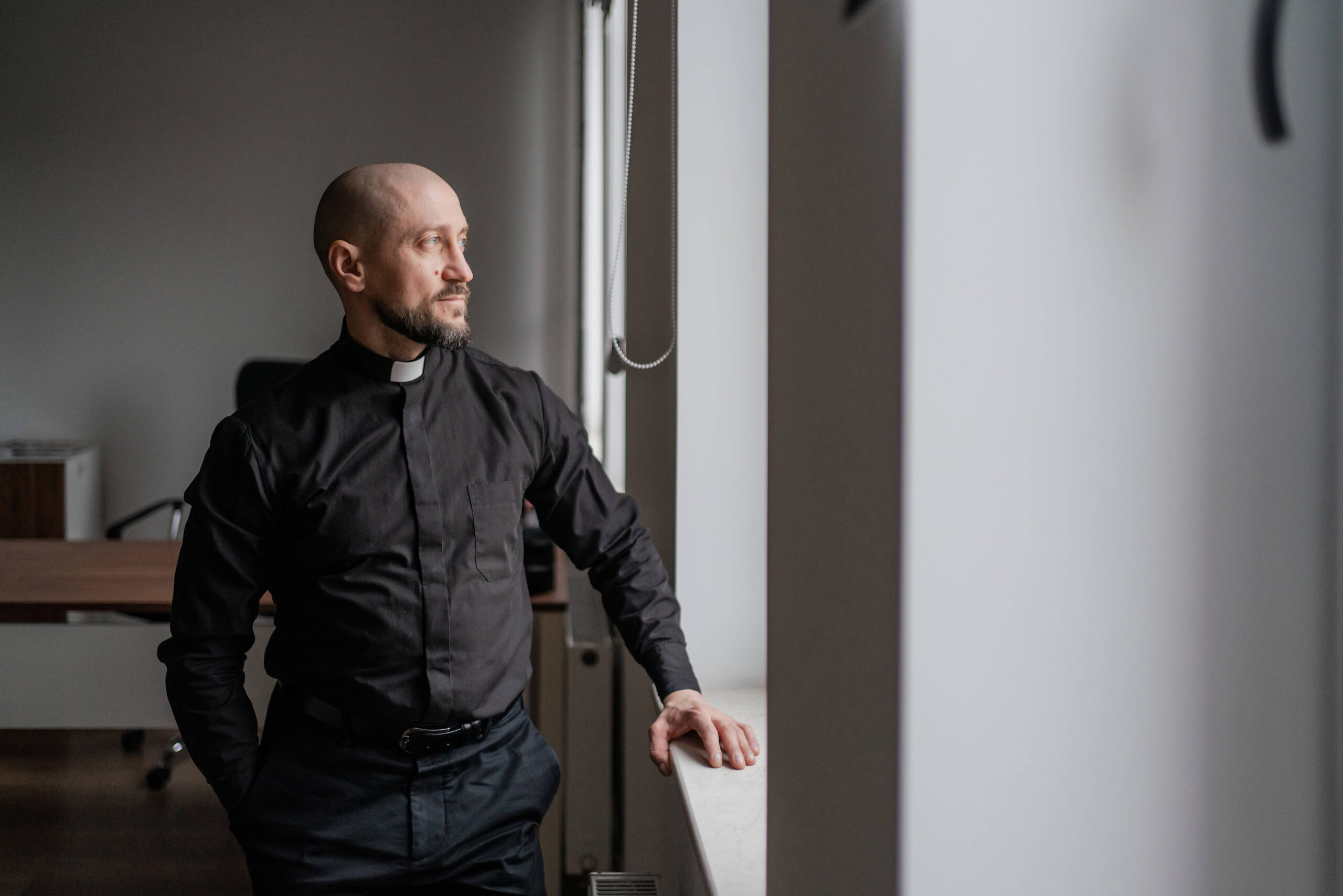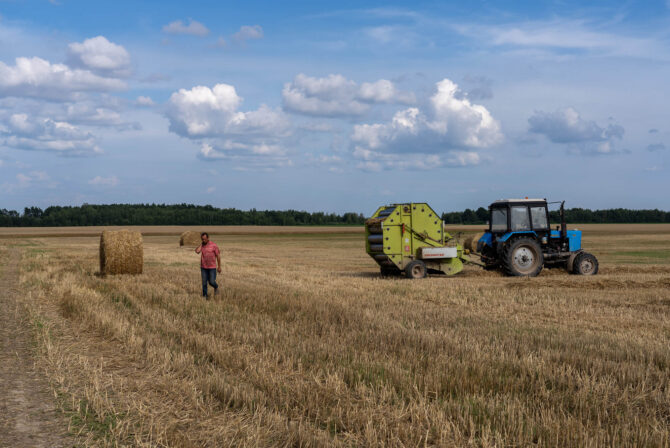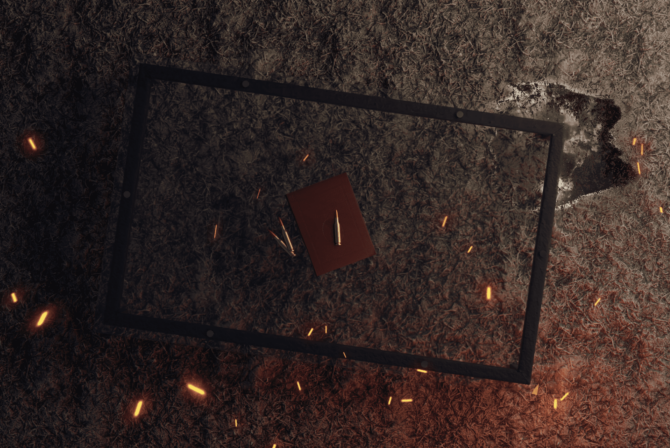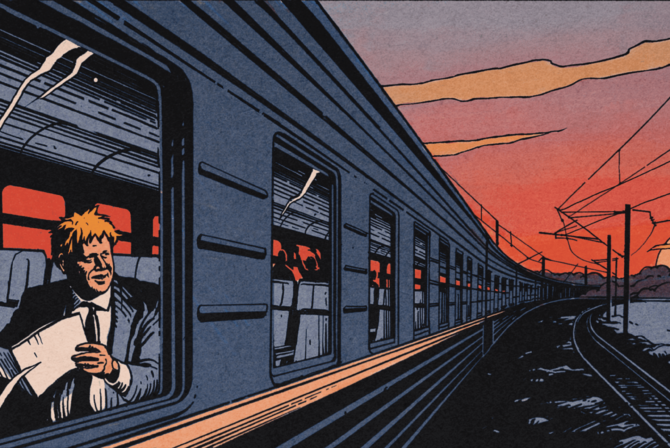If you walk in the morning near St. Michael’s Golden-Domed Monastery in Kyiv, you might see an unusual runner there. He is fairly short and of slim build. Usually, people like him are associated with the words ‘nimble’ and ‘agile.’ The unusual thing about him is that he always stops to pray in front of the Wall of Remembrance from which thousands of fallen Ukrainian warriors look out on the world. The runner is Andriy Zelinsky, a monk, a public figure, a lecturer, a military priest, and a co-founder of the Ukrainian Leadership Academy.
In his books, Zelinsky often repeats a phrase that is far from original: life is movement. But he fills it with a special meaning and forms his own philosophy, in which running is one of the ways to feel free not only physically. He sees freedom not as an abstract concept, but first and foremost as a way to put ideas into practice. Therefore, freedom remains only a dream if it is not translated into a concrete result.
§§§
The Ukrainians Media is an award-winning independent media company focusing on high-quality, long-form, and visual journalism. Our mission is to foster positive social changes in Ukraine.
This story was created thanks to the support of our readers. Please join The Ukrainians Community on Patreon and help us publish more important and interesting stories.
§§§
To fix a person
Andriy Zelinsky traveled around the United States of America when he was still in elementary school. He visited all sorts of places: from the cowboy pastures of Texas to the prairies of Iowa, from the snows of Illinois to Road 66 to the beaches of California, and then to Lake Ontario, the Great Canyon, and Niagara Falls. And he did it all without leaving home. Political maps of the world became one of the boy’s favorite toys ever since they appeared in Lviv bookstores in the early 1980s. The boy would open the map and spend hours poring over the markings, names of foreign cities, mountain ridges, and the arteries of river. America attracted the child’s attention the most. It seemed like another planet to a Soviet child growing up surrounded by adults, exhausted from standing in never-ending lines and brainwashed by primitive communist propaganda.
“Back then, in Soviet Lviv, I could not imagine that one day I would travel to America. I did not even dare to dream about it. It was the same as going to Mars,” Andriy Zelinsky recalls today.
In high school, political maps gave way to books. Reading became a new way for Andriy Zelinsky to explore the world. The boy was fascinated by Hryhoriy Skovoroda. He does not remember what impressed him so much—the image of the philosopher as a rebel, his philosophy of the heart, or his nomadic lifestyle. But it was Skovoroda who helped him set the priorities of his life on learning and applying knowledge.
“In his texts, Skovoroda uses the word ‘heart’ 1,146 times. It is with good reason that dignity, that is, goodness of heart, is at the core of the Ukrainian philosophical tradition. The Ukrainian school of philosophy is very heart-centered. Personality is at its core, because everyone has dignity, everyone has a heart in which wisdom resides. This is what really distinguishes us from others. For us, dignity is a universal value, whereas in European philosophical discourse it was linked to social status, to belonging to an aristocratic family.”
For a long time Andriy thought of becoming a doctor. His mother wanted her son to help people. When the boy turned 11, he decided to realize her wish, but in a different way—through religion.
In the late 1980s, the Ukrainian Greek Catholic Church emerged from the underground. Christian youth organizations began to operate openly in Lviv. Andriy joined this community. At first, it was the external attributes of Christianity that attracted the boy to the religion. He was simply curious about spending time with believers. But then The Confessions of Saint Augustine and The Lives of the Saints fell into his hands, and this determined the rest of his life. He read more and more books on Christianity. And then he read about the practice of silence in The Lives of the Fathers.
“Of course, I also decided to be silent for a few days. My mother was shocked. She wanted to call a doctor. But I felt strongly that if they did not speak, I should not speak either. I tried to practice what I had read about in the books. Not just to know things, but to put them into practice.”
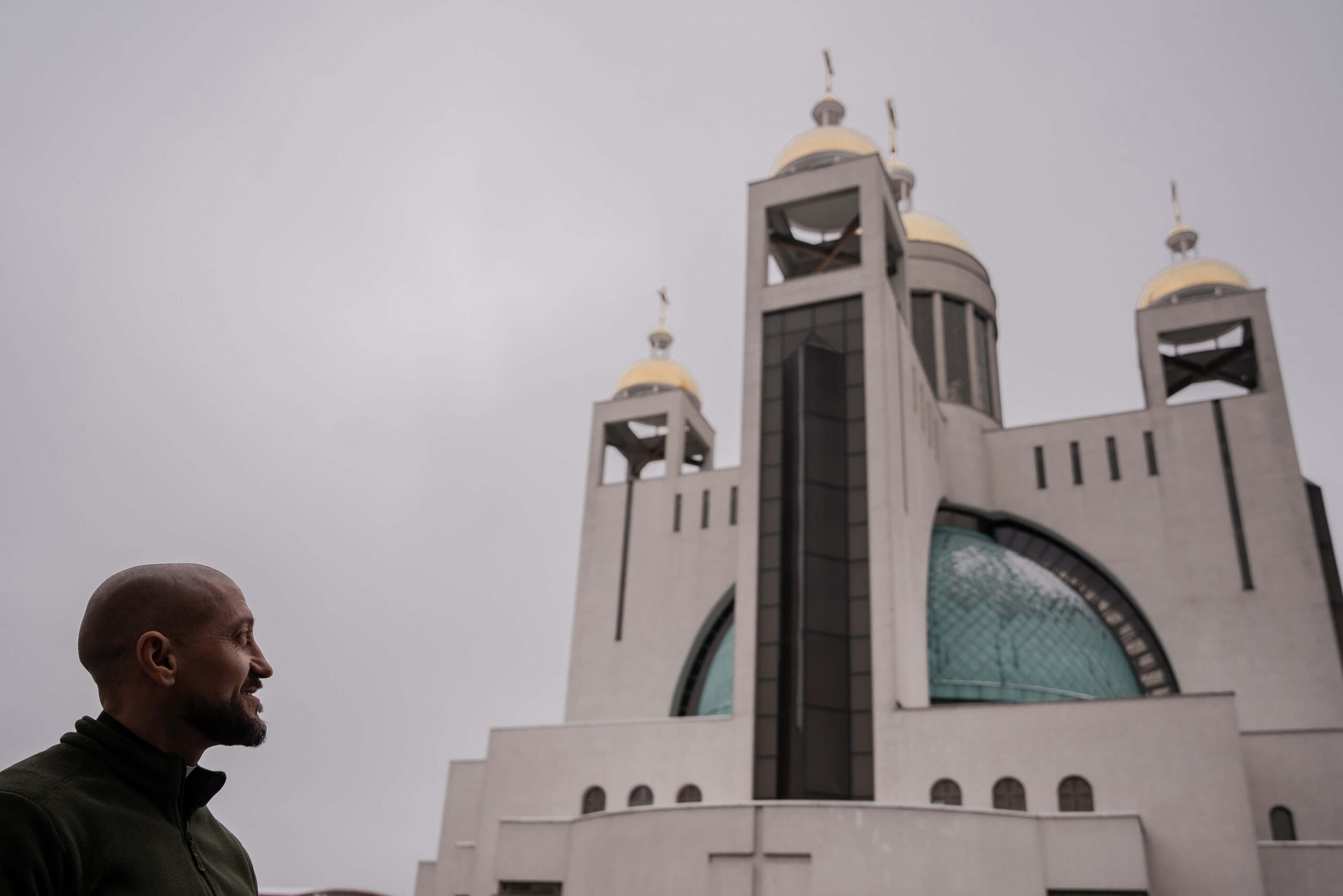
Priest Sebastian Dmytrukh remembers Andriy Zelinsky at that age:
“I remember how Andriyko—he was ten or twelve years old at the time—came with his mother to St. John’s Monastery in Lviv. He was different from other children in that he was very attentive and grasped things quickly. He looked around with those little eyes as if he was devouring everything. I think that in his case we can speak of a vocation that shows itself already in childhood. Andriy could seem like a proof for skeptics who believe that this is not possible. Later, I was not surprised when Andriy enrolled in the seminary. I knew he would make a good priest. And I was right.”
Father Zelinsky says books helped him set goals and focus on achieving them, especially during his childhood and adolescence. They pushed him to double-check things and try them out in practice. In this way, he learned what freedom meant. Through the books, Andriy later felt a spiritual closeness to the Jesuits—the Catholic monastic order where, according to Father Zelinsky, ‘not abstract ideas’ are taught, but ‘how to fix a person internally.”
“I am beginning to realize more and more that my childhood moved me to do all the things I do now. My present has evolved from things that influenced me as a boy.”
A Mission to ‘Mars’
In 1994 Andriy Zelinsky decided to enroll in the Klymentiy Sheptytsky Lyceum. After the interview he was very worried whether he had given the right and correct answers. The teachers could not understand why he was so worried, because he seemed to be one of the best candidates. So, a 15-year-old boy fulfilled his dream of studying at a specialized school.
As a first-year student, Andriy arranged what he calls ‘double curriculum.’ After classes, he devoted himself to the syllabus he had developed himself. He read anthologies, studied ancient and Greek literature, and learned history and geography. He also took a course on the Holy Scriptures. Such self-discipline could not but produce results. After graduating from the Lyceum, Andriy enrolled in the philosophy program at St. Basil College. This school was founded in 1939 in Stamford, Connecticut. What was a dream two hundred and twenty-five million kilometers away became a reality.
Light—that’s what Andriy Zelinsky says when asked what his first impression of the United States was.
He explains that he left Ukraine in 1997. “When I walked home from my English classes in Lviv, there was only one streetlight burning on Pidvalna Street. There was galloping inflation and regular power outages. And now I found myself in a country that was incredibly well lit. According to American regulations, public buildings had to be lit all the time, even at night. At first, I turned off the lights because I just could not understand how that was possible.”
After his first impressions of the United States had settled down, the young man began to turn his childhood fantasy trips through America into reality. His goal was to see the country, but at the same time combine travel with doing good things. During the vacations, he went to Los Angeles to volunteer for the Missionaries of Charity Brothers, work with the homeless, and help migrants from Latin America. The experience of working with L’Arche in Syracuse (USA) and Toronto (Canada) was also important.
“It took three days and three nights to get from the East Coast to the West Coast by bus,” he says. “Passengers and drivers changed. Only the bus and I stayed the same. But I wanted to see everything, so I made that trip. Just like I did when I was a kid with the map.”
These trips were the best opportunity to put into practice the knowledge acquired in college. Andriy simply contacted volunteer organizations and hit the road.
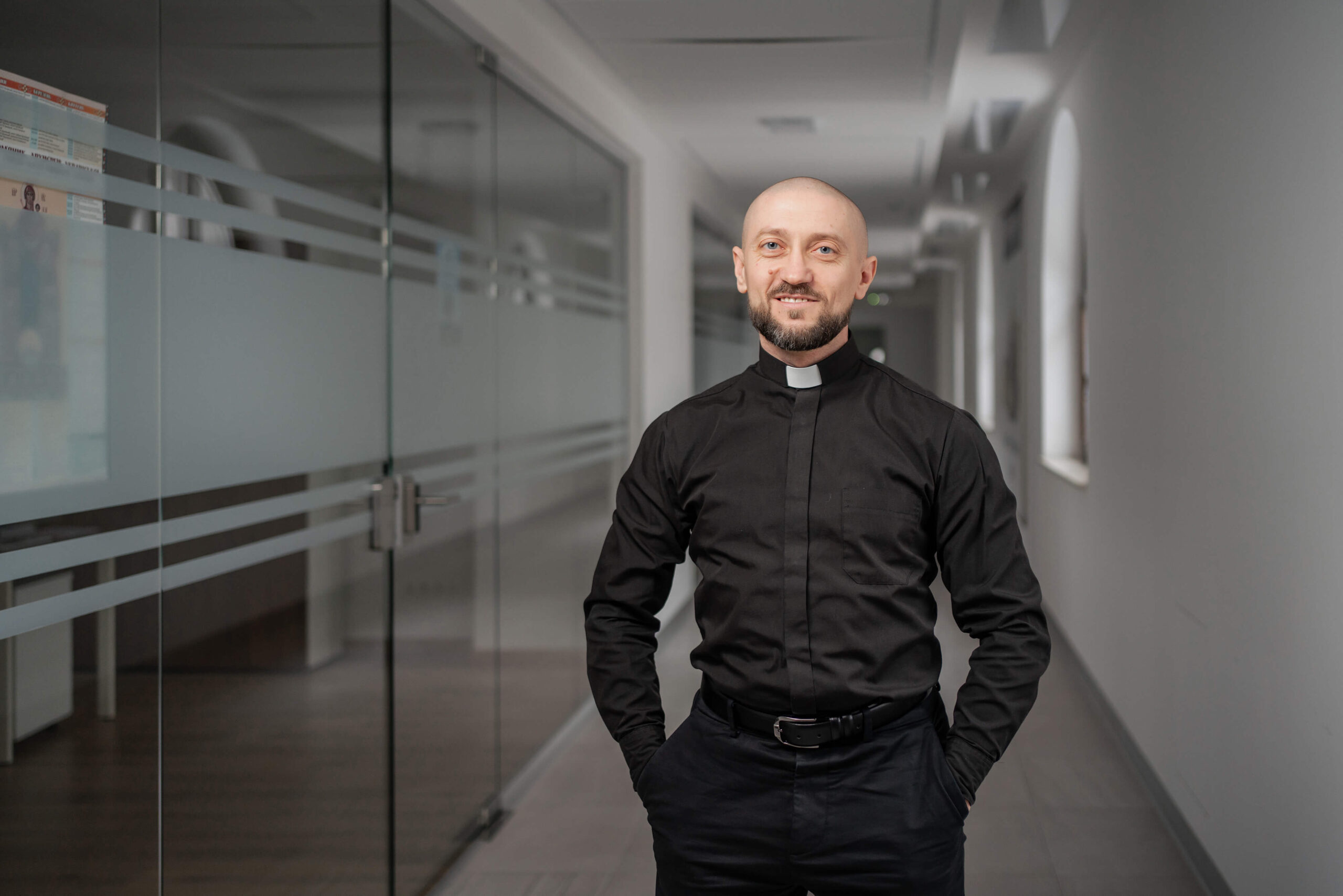
Back in the late 1990s, the United States helped him take a better look at the world around him. And not just literally. Andriy never liked to speak in public. He was an introvert whose favorite pastime was sitting alone among the stacks of books. In elementary school, he felt stressed every time he had to recite a poem in public, and he did his best to avoid it. The turning point came in high school. And during his time abroad, to his surprise, Andriy Zelinsky discovered his talent for attracting the attention of the audience. Zelinsky won the student public speaking competition twice. He went on stage without rehearsing or memorizing his text. He remembers one special moment:
“After one of the contests, when the results were announced and I was declared the winner, an older man came up to me and said, “Be very careful in your life, because people will believe you.” And then he disappeared into the crowd.”
As so often in youth, Andriy tended toward radicalism: evangelical poverty had to be absolute; help had to be maximal. But at some point, someone helped him realize that radicalism is a form of escape from oneself. In fact, the boy wanted to dive deep into the realm of research. So, he continued his studies after returning to Ukraine from America in 2001.
The power of daring
After college in Stamford, Andriy Zelinsky enrolled at the Pontifical Gregorian University in Rome. If America helped him ‘learn how to learn’, Italy taught him to ‘venture out into the world.’ In Rome, the young man began to put into practice the talent he had discovered in the United States—the talent for organizing things. Zelinsky founded and led a theological club. He also discovered his love for pasta and was firmly convinced that his decision to continue studying was the right one. Books led him to understand how people and the world function. Fifteen years later, this knowledge would prove crucial for him.
Rome also helped him make a final decision about which order to join. When Andriy informed his parents of his intention to become a monk, they asked him not to choose an enclosed order. Zelinsky, who was 23 at the time, joined the Society of Jesus, a Catholic monastic order. The young monk was attracted to the Jesuits’ proactivity and depth. They know well the labyrinths of the human spirit, he says, and encourage openness to the world, constant movement, and overcoming challenges.
“I could have stopped a long time ago. But the Jesuit philosophy has this concept that God is always greater. It asks you to strive for more and to have higher standards for yourself. Otherwise, instead of maintaining a relationship with God, you risk creating a household idol that always suits you and asks nothing of you. Not even a morning run,” says Father Zelinsky.
This mindset helped Andriy enroll in Kyiv-Mohyla Academy when he returned to Ukraine. After studying philosophy and theology abroad for twelve years, he decided to get an education in Ukraine as well, majoring in political science. He also saw a connection between the Academy and his favorite philosopher, Skovoroda. However, Andriy first had to work with a Ukrainian language tutor because he had been using other languages for academic purposes for so long. He says that at Kyiv-Mohyla Academy he studied not only the subjects on the curriculum, but also ‘the mechanics of social life.’
To attract the favor of heaven
After twenty years in the academic environment, Father Zelinsky plunged into a completely different element that was not typical for him. In 2014, he became the first chaplain at the headquarters of the anti-terrorist operation—and one of the few who received official permission to go to war.At first, the priest visited the wounded at the main military hospital in Kyiv and collected donations for the military. But this was apparently not enough for the Jesuit. Zelinsky approached the Department of Military Chaplaincy of the Patriarchal Curia of the Ukrainian Greek Catholic Church so that the church would help him reach an agreement with the headquarters of the Ukrainian Armed Forces for permission to serve as a chaplain. It was a success. In June 2014, Zelinsky was sent to the anti-terrorist operation headquarters near Slovyansk. Today, Father Zelinsky describes this experience as one of the most fascinating adventures in his life and as his ‘intrinsic labor.’ Together with the Ukrainian armed forces, he went through all the hot zones in the east of Ukraine at that time.
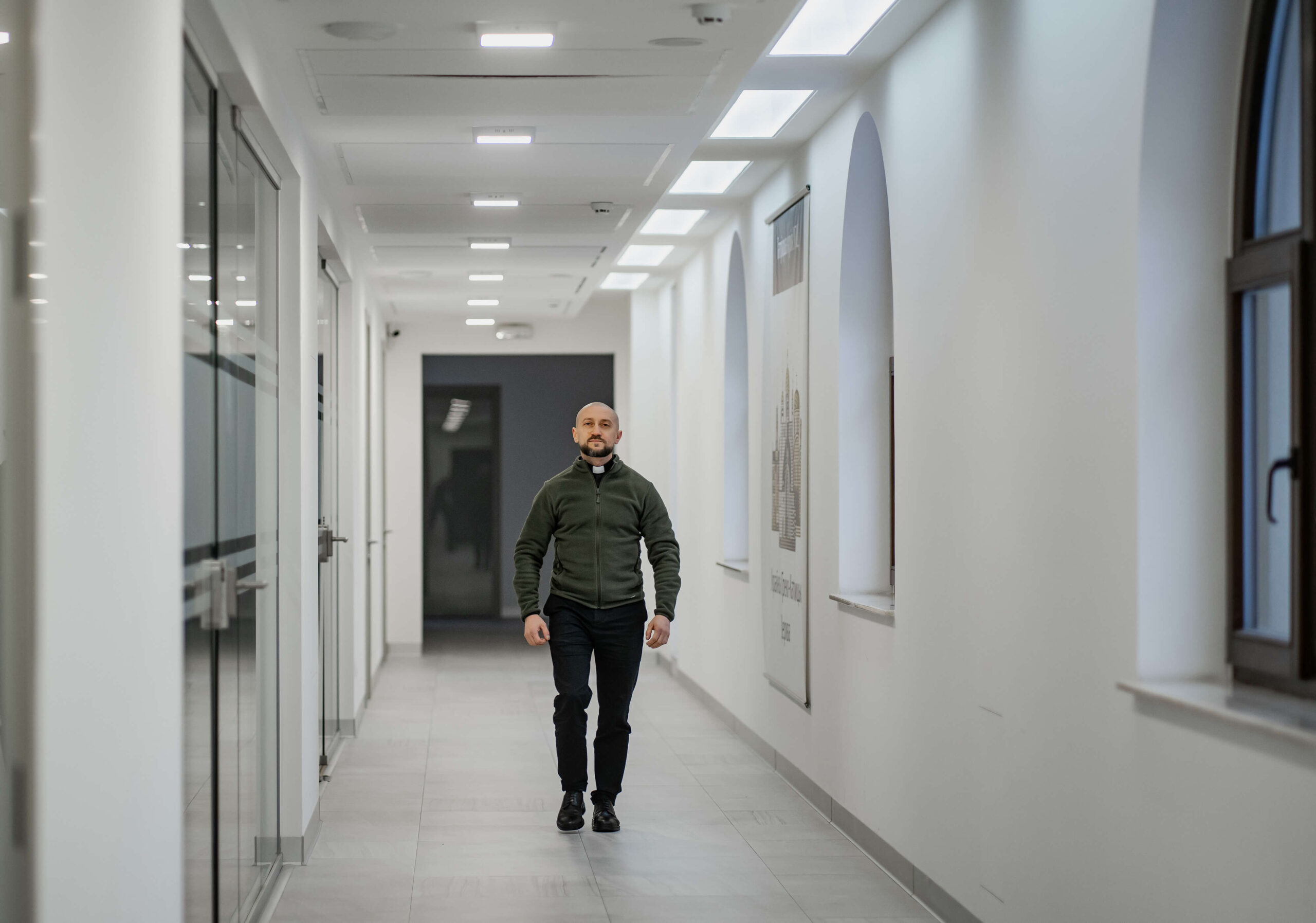
“The commanders of one of the brigades allowed me to go to the Donetsk airport. But this happened at a time when, due to agreements, only a limited number of military personnel were allowed to go there. So, the commander asked me to stay in Pisky, as it would be better to send a soldier there in my place. I was a chaplain and could not use the weapon, which meant that our soldiers would have had one gun fewer. Turned out, it was my last deployment.”
Debaltseve and the industrial area of Avdiyivka followed. And since the summer of 2017, Father Zelinsky has been serving full-time in the 36th Separate Marine Brigade.
“When soldiers come to the chaplain with their problems, it is always about a search for something deeper,” he says.
“I often say that a military chaplain’s job is to attract the favor of heaven to a person in military uniform to protect them.
As a chaplain, I feel like a pastor and a missionary. That feels very Jesuitical when you are working on the front lines and you do not have any guarantees. What kind of guarantees can you even have on the front lines? At the front, I realized that all statuses and riches lose their meaning when you know you might die soon. The war has become one of my universities, like Faith and Light, the spiritual exercises of St. Ignatius of Loyola, the United States, Rome, and Kyiv-Mohyla Academy before.”
In the photos on the Facebook page of Father Andriy Zelinsky there are quite a few soldiers. One of them is Severyn Vitvitskyi, director of aircraft, engines, and evacuation equipment maintenance—he is dressed in camo and looks straight at the camera, his arm around the chaplain’s shoulder. During the war, the first time they met was in the newly liberated Kramatorsk in 2014, and the second time was in Mykolaiv. Severyn’s brigade had been transferred there from Crimea, where they had served. Vitvitskyi says that the events of 2014 at Belbek airport were the most horrific in the history of his brigade.
“One thing Andriy said I will remember all my life,” Severyn says. “We were talking about the challenges the military faced during the war. And I said that we were officers and would take everything into our own hands. But Andriy remarked that the belief that you can do things on your own is one of the greatest illusions of people and humanity. I was surprised by his words. He said that we should not be afraid to ask for help. And now, after February 24, 2022, it’s especially obvious that maybe we really cannot handle everything on our own.”
Severyn noted that people at war have a need for light. And military people often seek it by sharing their concerns with people they can trust. Soviet practices, where there was hostility and mistrust among soldiers in the army, are gradually becoming a thing of the past. The establishment of the institution of chaplainship at the beginning of the war in 2014 has greatly facilitated this. There is more and more light in the Ukrainian army.
“Whenever I met Andriy, he was always attentive and wanted to help. How are you? Is everything all right? How can I help you? He even volunteered to top up our boys’ phones. He inspired us, tried to motivate us, and supported us in the most difficult moments. This may sound flattering, but I can say that he is a person who can provide answers to your questions.”
Journalists often ask Zelinsky if he experienced the moments of breakdown during his service as a chaplain. He always says no, that he only experienced burnout. And then he adds:”I live at least four lives. The first is the life of a clergyman—with daily prayers, meditations, and a week of solitude and silence each year. The second is a life in academia with dozens of lectures and constant research of our sophianic spirituality. The third is life in youth centers, in particular, teaching at the Leadership Academy, which lets me see the world through the eyes of my young students. And the fourth is the military culture, with its specific ethos, in which I have been involved since 2006. When oxygen is blocked in one of these environments, I have others. For example, when I come back from the front lines, I immediately throw myself into another activity until I heal.”
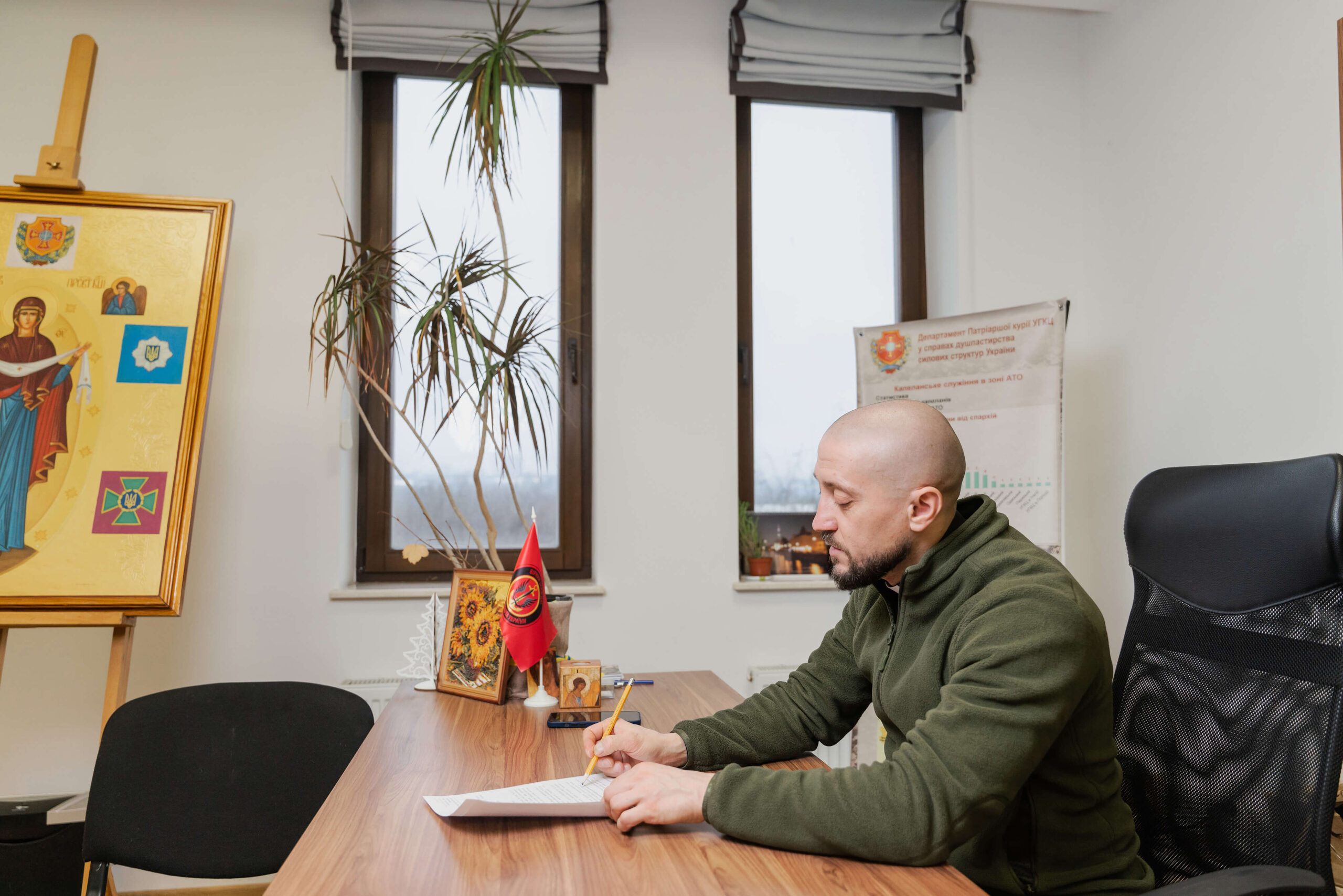
When asked about his role models, Father Zelinsky names not only Hryhoriy Skovoroda, but also Leonardo Da Vinci, artist, writer, musician, and scholar. He says that the multidimensionality of personality is crucial in today’s world.
Padre
Yuliya Tychkivska, co-founder of the Open University of Maidan and executive director of the Aspen Institute Kyiv, kindly calls Father Zelinsky ‘Padre.’ She met him over a decade ago while studying at Kyiv-Mohyla Academy. Yuliya was pursuing economics, while Andriy majored in political science. They saw each other in one of the electives they both attended. After the Maidan revolution, they became friends. Over time, the friendship turned into a family relationship: Zelinsky baptized Roman and Yuliya Tychkivski’s three children.
“I feel an intuitive trust in Father Zelinsky,” Yuliya says. “But it’s also based on shared values. He is an incredibly dynamic person. Movement is my main association with him, because he never stands still. And I mean movement in all its dimensions—personal development, physical, spiritual, emotional, and intellectual. I think that’s what resonates with me the most. Andriy always does what he preaches. Another thing I find important with him is depth. People often lack that these days.”
Yuliya Tychkivska says that Father Zelinsky dares to provoke intellectual challenges. This is also evident in personal conversations—he pulls you out of triviality and ‘lifts you up to a new level.’ Profundity—this is the second characteristic of Father Andriy, Yuliya thinks. She notes that Ukrainian society desperately needs it today, as the war presents Ukrainians with challenges that require finding complex answers.
“He also knows how to support people,” she says, “and that’s a wonderful quality for such a proactive person. He always finds time to cheer up his loved ones when they need it. I know he’s a good friend to a lot of soldiers. I often saw marines or cadets visit him when I passed by. The first few months of the full-scale invasion were very difficult for him. He lost some very close friends and students during that time. That’s a lot of trauma, and I could sense that he was in a state of complete pain. But he’s coping with it.”
Working for long-term success
We spoke with Andriy Zelinsky between his lectures to the students of Ukrainian Catholic University and later the Ukrainian Leadership Academy. This is the activity that provides him with the greatest supply of oxygen.
After the Revolution of Dignity, a large-scale initiative was needed, aimed at continuity and long-term work. Roman Tychkivskyi, co-founder of the Open University of Maidan, brought together a group of opinion leaders to develop a youth program that would produce civic leaders. They used Israel’s mechina as a model. These are centers of informal learning where young people learn the basics of philosophy, history, culture, and government before serving in the army and enrolling in universities. The centers also shape national consciousness and develop leadership skills.
Andriy Zelinsky joined the group and became a co-founder and member of the supervisory board of the Ukrainian Leadership Academy.
“The UK has an aristocracy. So, they always have a talent pool. You do not have to look for, say, value-oriented ministers. In the United States, there are exclusive college clubs whose members share values and later promulgate them in their political careers. But we had nothing like that—and no time to establish it. So, we had to find a quick and effective mechanism to grow future elites. And that’s exactly what our Academy was.”When Zelinsky talks about the Leadership Academy, his eyes light up. They managed to adapt the concept of Israeli mechina to the Ukrainian context and create a specific philosophy. The shortest definition of the Ukrainian Leadership Academy is this: it is a values-based formative platform of personal and social development. Values-based personal development—this is what distinguishes the curriculum of the Academy from the programs of other leadership schools in Ukraine.
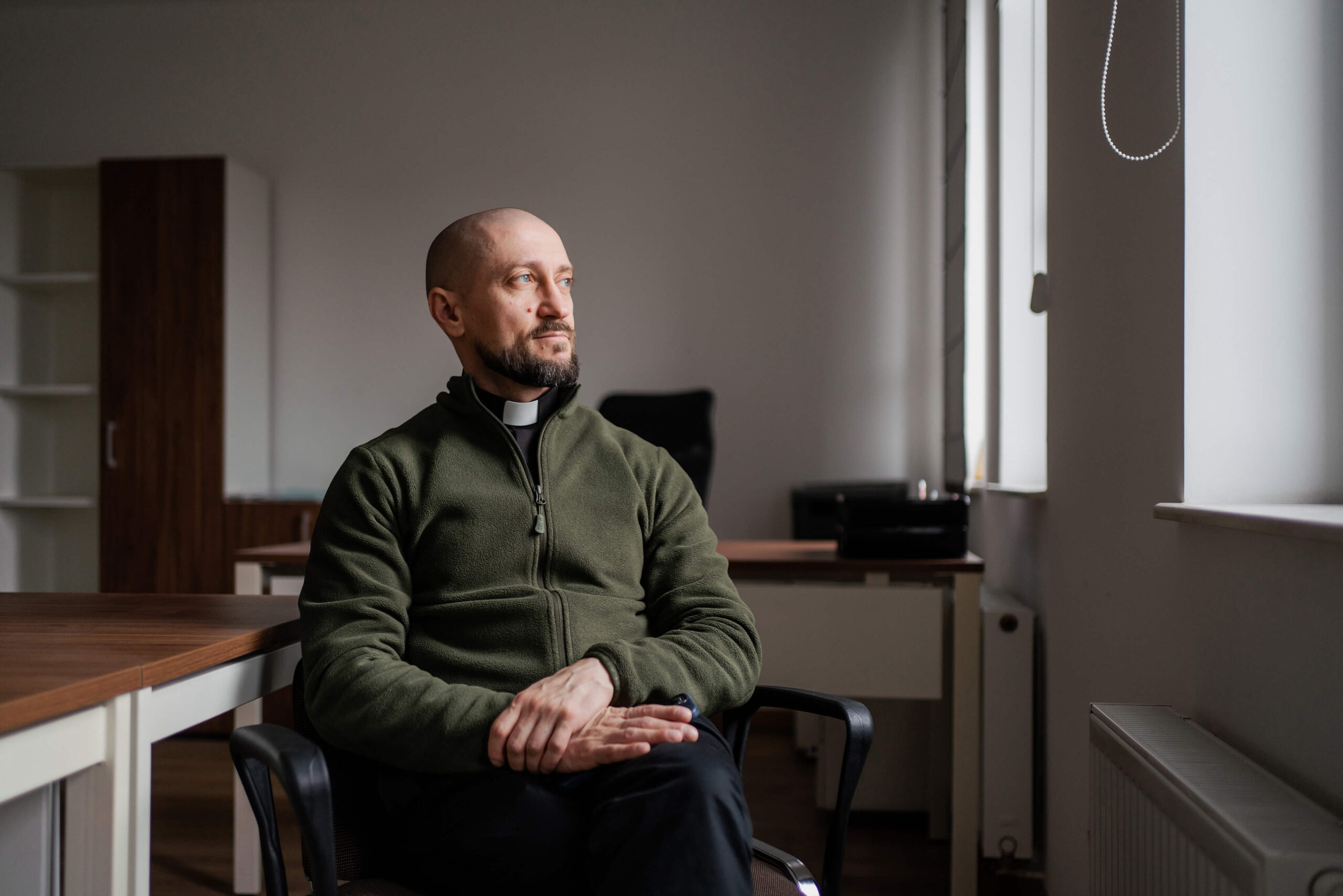
“Leadership is usually seen as a set of certain competencies necessary to achieve goals. However, the most important thing—personality—is ignored. But if someone is not fully developed as a personality, they cannot overcome many personal challenges. And if their activities are public, they can quickly become hostage to certain compensatory mechanisms. For example, a politician might use their TV popularity to compensate for not being loved. Our job is to grow leaders who can take responsibility for their own lives and the lives of their community and country.”
The Academy curriculum consists of four modules that develop the identity of the leader: ‘Servant,’ ‘Warrior,’ ‘Researcher,’ and ‘Traveler.’ Each module begins with an introductory lecture by Andriy Zelinsky. Father Zelinsky also reads lectures on politics and philosophy.
“My first impression of Andriy Zelinsky was a shock,” says Yevheniya Mateychuk, acting director of the Ukrainian Leadership Academy.
“I started working for the academy in 2018. Later in the year, in September, the Academy held a school for mentors. I was running late and entered the room just as Father Zelinsky was speaking. He spoke about the processes that take place deep inside a person facing a challenge. I was impressed by how profound and at the same time accessible his words were.”
Students attend the Leadership Academy for ten months. Before the covid pandemic broke out, the students went on a study trip to Israel in the first semester and to Brussels and other EU countries in the second semester. They studied their experience of state-building. Before the Russian full-scale invasion of Ukraine, the Academy had its centers in Lviv, Kyiv, Kharkiv, Mariupol, and Mykolaiv. Each of these centers had forty students. Since February 24, 2022, the Academy has been operating only in Lviv. There are two languages of communication—Ukrainian and English. In each center students from all over Ukraine come together. And, of course, students start five mornings a week with a run.
For seven years, the Leadership Academy alumni have run their club, Sophia. It is a network of values, ideas, friends, and projects. Once a year, they meet and share their successes and plans. About 60 members of the Academy’s team and community are now serving in the Ukrainian army. Unfortunately, five alumni died in the war with a gun in their arms.
***
“God – person – Ukraine” is a version of a classic conservative triad: “God – family – Motherland.” Andriy Zelinsky’s activity makes it possible to rephrase it like this. He is a monk, chaplain, and lecturer in an educational program aimed at the qualitative transformation of society.
“You have to constantly analyze what you do to find the meaning and the thrill in your work. Seeing the meaning and feeling the thrill are two characteristics of a healthy personality, in my opinion,” he says.
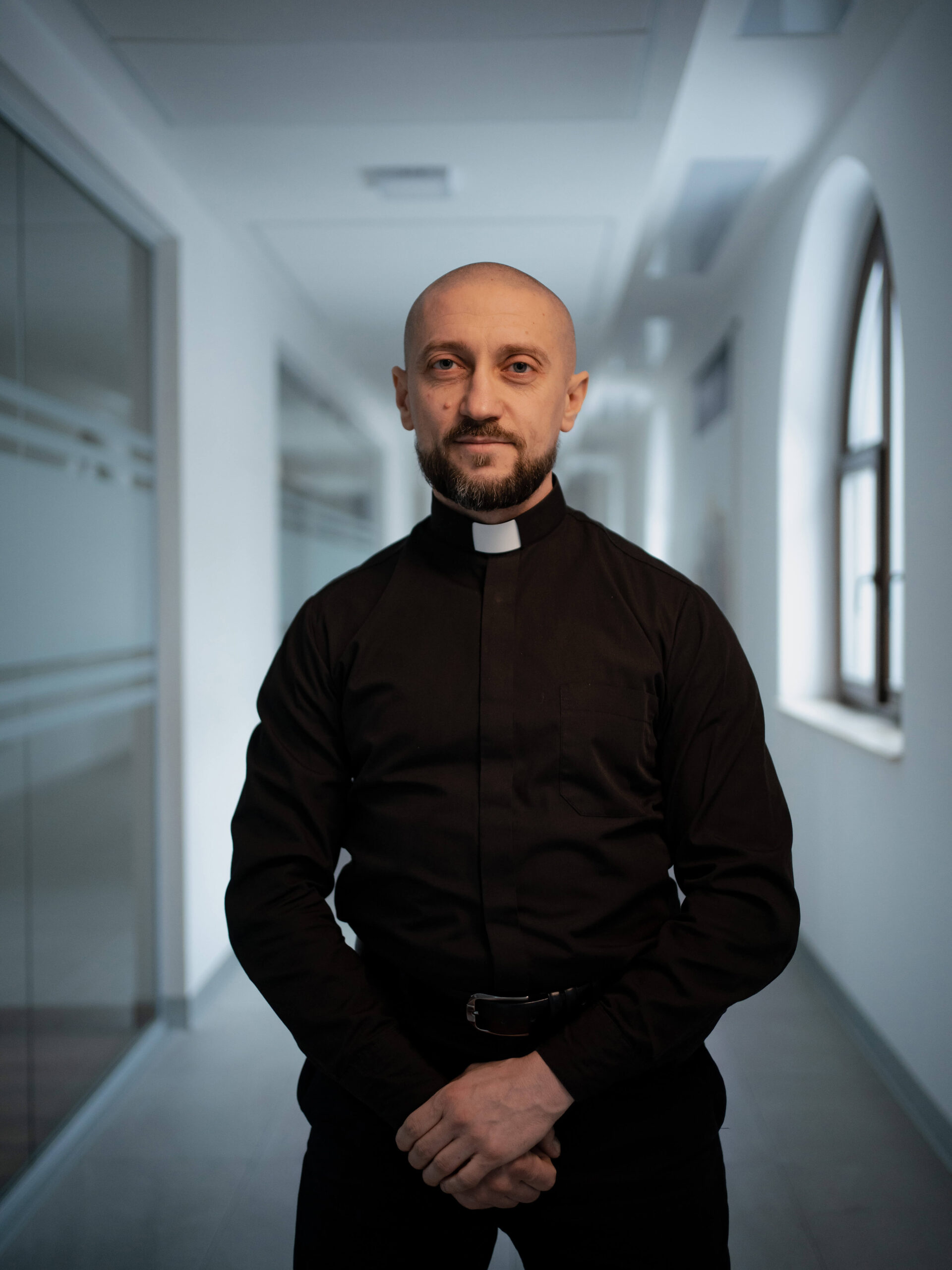
For all his experience and multiple activities, Father Zelinsky remains a man of books. He often calls himself so. This is evident in the complex terms he uses in his speech and in his habit of cataloging things he says along the way. When you see how much enthusiasm and energy Andriy Zelinsky has, you realize that he finds the meaning and the thrill in everything he does. Perhaps the best example of this can be found in his book God Comes in the Evening:
“One of my favorite exercises is running in the rain. Music thundering in my eyes, water dripping from my head, I run straight ahead, and then I see a puddle in my path. Big, deep, and wet. But I am not going to run around it. I plunge right in: splash, plop, woohoo! A wet jacket sticks to my wet body, water sloshes into my sneakers, rain mixed with sweat trickles into my eyes, but I keep running—soaked and… free!”
